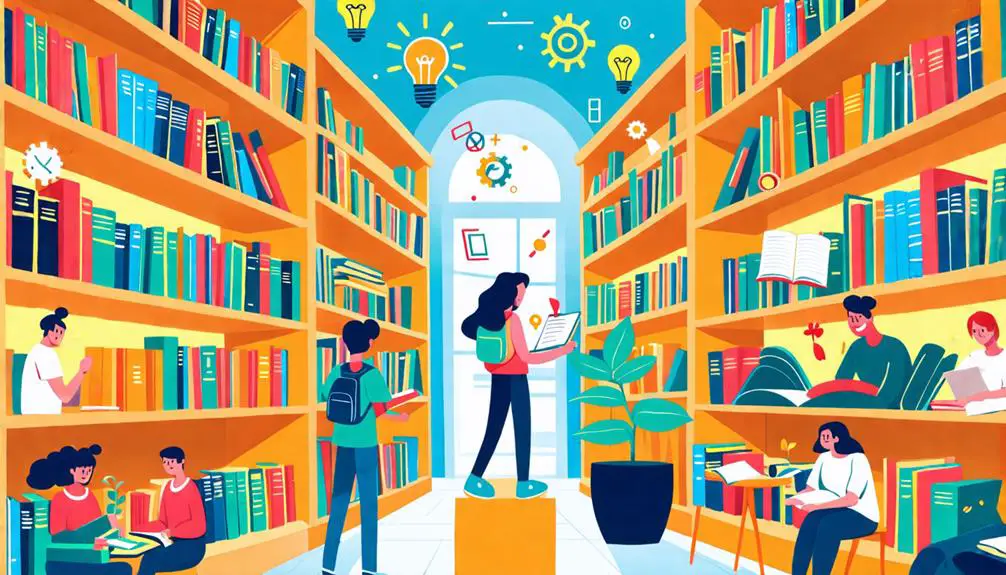The Benefits of Continuous Learning for Personal Growth
You might often find yourself wondering how to unfasten your full potential and navigate life's challenges more effectively. Continuous learning can serve as a powerful tool for your personal growth, enhancing not just your skills but also your confidence and adaptability in an ever-changing world. By actively seeking new knowledge and experiences, you can cultivate resilience and foster deeper connections with others. But what specific strategies can you adopt to make this journey more fulfilling and impactful? The answers might surprise you.
Understanding Continuous Learning

Continuous learning means actively pursuing knowledge at any stage in your life, beyond the confines of traditional education.
It's all about embracing a self-motivated approach to your learning journey, where personal growth and professional development become your primary goals.
By committing to continuous learning, you not only enhance your skills and knowledge but also cultivate adaptability—crucial in our ever-changing world.
Engaging in this lifelong learning mindset can lead to significant cognitive benefits, like improved memory and problem-solving abilities, making your brain work more efficiently.
Plus, as you acquire new skills, you'll likely notice a boost in self-esteem and personal fulfillment, reinforcing your sense of competence and accomplishment.
Importance of Lifelong Education
Lifelong education is essential for adapting to the fast-paced changes in today's world and achieving personal and professional success. The importance of continuous learning can't be overstated; it allows you to acquire new skills that enhance your adaptability in a rapidly evolving job market.
Engaging in lifelong education opens up numerous educational opportunities, fostering both personal growth and professional growth. With 70% of adults recognizing that continuous learning contributes to personal fulfillment, it's clear that investing in your education boosts your self-worth and satisfaction.
Plus, organizations that support ongoing learning see higher employee retention, with 94% of workers preferring companies that invest in their career advancement. Embracing lifelong education truly benefits you in every aspect of life.
Psychological Benefits of Learning

Embracing ongoing education not only enhances your skill set but also brings significant psychological benefits that can elevate your overall well-being. By engaging in continuous learning, you boost your self-esteem through acquiring new knowledge and skills, reinforcing a sense of accomplishment. This journey fosters mental agility, improving your emotional well-being and resilience in facing life's challenges. In addition, lifelong learning promotes social connectivity, allowing you to build supportive relationships and reduce feelings of isolation.
| Psychological Benefits | Impact on Personal Growth |
|---|---|
| Enhanced self-esteem | Greater self-worth |
| Improved mental agility | Better problem-solving skills |
| Increased emotional well-being | Resilience to life's challenges |
| Stronger social connections | Reduced feelings of isolation |
Professional Advantages of Learning
Investing in your education can greatly enhance your professional adaptability, making you more competitive in an ever-evolving job market. Continuous learning allows you to stay updated on industry trends, boosting your knowledge and skills.
This adaptability not only increases your employability but also opens doors for career growth, as employers often prioritize candidates with relevant qualifications. By engaging in ongoing education, you'll discover networking opportunities that can lead to valuable mentorship and collaboration.
Furthermore, continuous learning sharpens your critical thinking and problem-solving abilities, skills that are highly sought after in today's workplace. Embracing this mindset positions you for advancement and keeps you ahead in your profession, ensuring you can navigate changes with confidence.
Social Benefits of Continuous Learning

Continuous learning not only enhances your professional skills but also enriches your social life by connecting you with like-minded individuals.
Engaging in lifelong learning fosters social connectivity, allowing you to meet new people through classes and workshops. This collaborative environment combats social isolation, as you share common interests and ideas with others.
Participation in learning communities, whether in-person or on online learning platforms, promotes the exchange of contemporary issues and ideas, leading to lasting friendships and professional relationships.
Research shows that those involved in continuous learning often feel a sense of belonging, which positively impacts their emotional well-being.
Incorporating Learning Into Daily Life
Integrating learning into your daily routine can transform even the busiest schedule into an opportunity for personal growth. By making small adjustments, you can embrace continuous development without overwhelming your time. Here are three effective strategies:
- Schedule Learning Time: Block out specific times each week for online courses or workshops. This guarantees you remain consistent and engaged in your learning journey.
- Utilize Resources: Explore platforms like Coursera or Udemy to access specialized knowledge and skills that align with your interests.
- Reflect and Adapt: Regularly assess your learning experiences, adjusting your approach based on feedback to optimize understanding.
Setting Effective Learning Goals

Setting effective learning goals helps you create a clear path for personal growth and keeps you motivated throughout your learning journey.
Today, take the time to establish specific and measurable objectives that align with your aspirations.
Continuous learning often involves engaging in various learning activities that promote both personal and professional growth and development.
By identifying challenges as opportunities, you can build resilience and adaptability.
Regularly monitoring your progress allows you to assess your development, adjust your strategies, and stay accountable.
Utilize feedback and self-assessment to refine your goals, ensuring they remain relevant.
This proactive approach to setting effective learning goals will empower you to overcome obstacles and achieve lasting success in your learning journey.
Overcoming Learning Obstacles
Overcoming learning obstacles is essential for maintaining the momentum you've built while setting effective learning goals. To tackle barriers to continuous learning, consider these strategies:
- Prioritize Your Time: Allocate dedicated time for education, even amidst busy schedules. Use employer-sponsored training to access resources effectively.
- Embrace Mistakes: Foster a positive mindset by viewing mistakes as growth opportunities. Celebrate small victories to keep your motivation high.
- Utilize Resources: Explore accessible learning opportunities like free online courses, webinars, and podcasts to overcome financial constraints.
Conclusion
Incorporating continuous learning into your life isn't just beneficial—it's essential for personal growth.
Did you know that individuals who engage in lifelong learning are 21% more likely to report higher levels of satisfaction and well-being?
By embracing new challenges and seeking knowledge, you're not only enhancing your skills but also boosting your confidence and emotional health.
So, make learning a priority, set clear goals, and watch as you thrive both personally and professionally.







